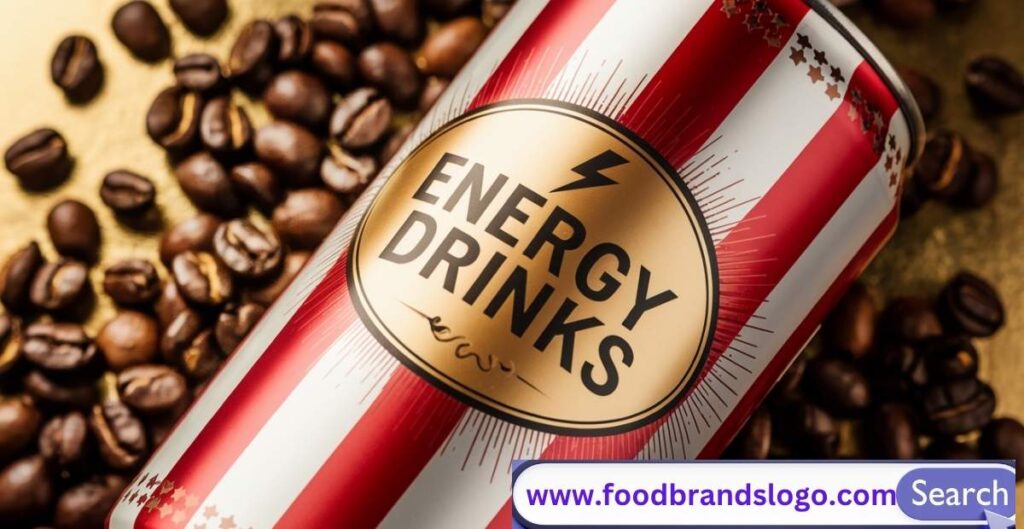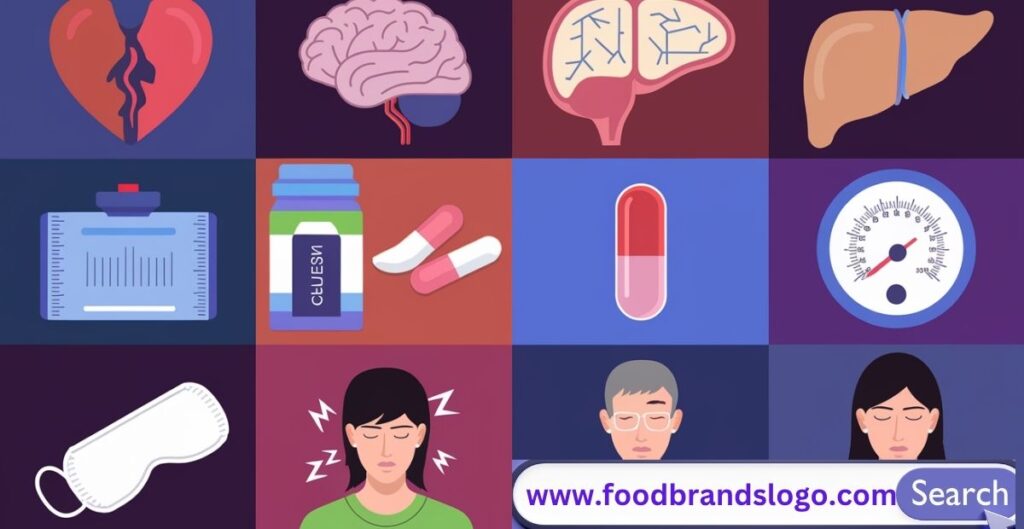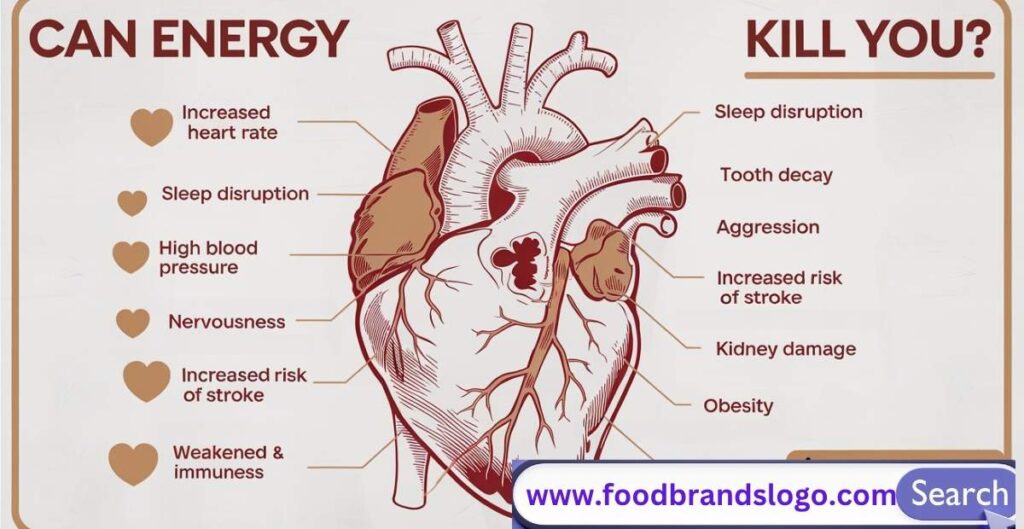Introduction
Imagine reaching for a can of your preferred energy drink to help you get through the day when you’re tired and up late. It’s sweet, effervescent, and it awakens you right away. Here’s the grim truth, though: can energy drinks cause death? The quick answer is that they can, depending on the situation.
These days, energy drinks are a need. These drinks offer rapid energy and improved performance, whether kids are studying for tests, athletes are exerting themselves, or employees are working late shifts. However, a number of health issues that are anything but energizing are hidden beneath that fleeting surge.
The Immediate Risks of Energy Drinks

Caffeine content in energy drinks is frequently high, perhaps two to three times that of a cup of coffee. In addition, they contain a lot of sugar, artificial sweeteners, and additional stimulants including taurine, L-carnitine, and guarana. Although this combination has some immediate health risks, it can provide a short-term energy boost.
Intoxication from caffeine is a serious and dangerous condition. High dosages can cause the following symptoms, particularly in people who are caffeine sensitive or have underlying medical conditions:
- Racing heart
- Dizziness
- Nausea
- Tremors
- Anxiety or panic attacks
- Confusion
- Heart palpitations
- Chest pain
And in extreme situations? cardiac arrest. Indeed, there is a definite correlation between energy drinks and ER visits as well as unexpected deaths.
The majority of cases included excessive energy drink usage or combining them with alcohol or other stimulants, according to the CDC and many systematic evaluations.
What Are 10 Negative Effects of Energy Drinks?
Let’s examine in more detail the top ten drawbacks of energy drinks, particularly when used frequently or in excess.
1. Increased Heart Rate
An obvious increase in heart rate is one of the most obvious side effects of energy drinks. They contain stimulants, particularly guarana and caffeine, which can make your heart beat more quickly while you’re at rest.
This may cause palpitations in certain people or even tachycardia, a condition in which the heart beats too quickly.
2. High Blood Pressure
Even in healthy people, energy drinks can increase systolic and diastolic blood pressure. Particularly if you already have hypertension or cardiovascular problems, this spike might strain the cardiovascular system and raise your risk of a heart attack or stroke.
Chronic heart disease and artery damage can result from persistently high blood pressure.
3. Anxiety and Restlessness
In addition to keeping you awake, too much coffee can make you jittery, nervous, and in some cases, even trigger panic attacks. Constantly feeling anxious or “on edge” can have a negative impact on your mental health, particularly if you already have anxiety problems.
Caffeine isn’t the only component that can exacerbate these symptoms; ginseng and taurine can also interfere with your body’s receptors.
4. Disrupted Sleep Patterns
Although you may believe that energy drinks provide you the vitality you need to get through the day, they frequently keep you up at night. Because caffeine has a half-life of about five to six hours, even a sip in the early afternoon can cause sleep disturbances hours later.
Poor sleep causes additional energy drinks the following day, which causes even worse sleep, creating a vicious cycle. Chronic insomnia develops over time.
5. Stomach Problems
Energy drinks are acidic and contain carbonation and artificial sweeteners, which can irritate the gastrointestinal tract. They may cause:
- Acid reflux
- Nausea
- Vomiting
- Cramping
- Diarrhea
Caffeine also stimulates gastric acid production, which can aggravate ulcers or cause gastric inflammation.
6. Damage to the Enteric Nervous System
The enteric nervous system, also referred to as the body’s “second brain,” regulates digestion and interacts intimately with the brain. Long-term energy drink use may disrupt this mechanism and cause gut-brain abnormalities, according to some research.
This may be the cause of mood swings, gastrointestinal problems, and even cognitive decline in certain individuals.
7. Risk of Caffeine Overdose
Caffeine overdose is possible and more frequent than you may imagine.
The FDA states that for healthy persons, 400 mg daily is the acceptable limit. Between 150 and 300 mg can be found in a single energy drink, and it’s simple to consume two or three without noticing you’re going over the limit.
Caffeine overdose symptoms include:
- Vomiting
- Tremors
- Seizures
- Syncope (fainting)
- Cardiac arrest
8. Dependency on Stimulants
Caffeine addiction can result from relying on energy drinks to get your daily boost. When you don’t get the shot of stimulation, your body begins to want it, and withdrawal symptoms like depression, irritability, headaches, and exhaustion occur.
You could require more and more over time simply to feel normal. A classic symptom of reliance is that.
9. Long-Term Heart Health Effects
Long-term consumption of energy drinks has been linked to cardiovascular issues, including:
- Myocardial stress
- Arrhythmias
- Left ventricular dysfunction
- Chronic hypertension
These conditions, when undiagnosed or untreated, can contribute to heart failure or sudden cardiac death.
10. Dehydration
Since caffeine is a diuretic, it causes fluid loss by increasing urine production. You run the risk of suffering from severe dehydration, which impacts all of your body’s cells and organs, when you combine it with vigorous physical exercise.
Some signs of dehydration:
- Dry mouth
- Headache
- Muscle cramps
- Dizziness
- Confusion
Long-Term Side Effects of Energy Drinks

The long-term effects go beyond immediate symptoms. Habitual use of energy drinks has been linked to:
- Poor sleep hygiene and chronic fatigue
- Hormonal imbalances
- Increased risk of type 2 diabetes (due to high sugar content)
- Kidney damage
- Neurological disorders
- Poor academic or professional performance
One worrying fact? Early energy drink consumption increases a child’s risk of using additional stimulants or developing substance abuse problems.
Can Monster Energy Drinks Kill You?
Although Monster is one of the most well-known brands in the energy drink industry, it has also been the subject of numerous lawsuits involving fatalities and cardiac arrest.
Depending on the flavor, Monster Energy can have anywhere from 160 to 240 mg of caffeine per can. That, along with ginseng and taurine, creates a very powerful combination.
Monster Energy usage has been linked to a number of fatalities. The drink was a known trigger, even though these cases frequently entail underlying medical issues.
Compared with Other Drinks
Let’s compare caffeine levels:
- Monster Energy (16 oz): ~160–240 mg caffeine
- Red Bull (8.4 oz): ~80 mg
- Coffee (8 oz): ~95 mg
- Cola (12 oz): ~35 mg
- Pure caffeine powder (1 tsp): 3,200 mg (lethal dose)
Clearly, energy drinks contain far more caffeine than your average soda—and are often consumed in larger quantities.
Symptoms of Drinking Too Many Energy Drinks
If you’ve had one too many, here are some warning signs your body might send:
- Intense anxiety or panic
- Racing or irregular heartbeat
- Insomnia lasting more than one night
- Shaking or tremors
- Muscle twitching
- Vomiting or nausea
- Dizziness or fainting
- Chest pain or tightness
- Seizures or confusion
Seek immediate medical help if you experience severe symptoms. It’s not worth “waiting it out.”
Can Energy Drinks Kill Your Baby?
Yes, if you’re pregnant, energy drinks pose a serious threat. Caffeine crosses the placenta and affects the baby’s developing nervous system. Excessive caffeine can lead to:
- Miscarriage
- Low birth weight
- Premature labor
- Stillbirth
The American Pregnancy Association advises pregnant women to limit caffeine to under 200 mg/day. Just one energy drink can exceed that.
Can Alcohol and Energy Drinks Kill You?
Mixing energy drinks with alcohol is a dangerous cocktail. While alcohol is a depressant, energy drinks are stimulants. This masks the feeling of drunkenness, making people drink more than they realize.
This combination leads to:
- Increased risk of alcohol poisoning
- Risky behavior
- Dehydration
- Heart complications
- Sudden cardiac death
Drinks like Four Loko became infamous for this very reason and were banned or reformulated.
Are Sugar-Free Energy Drinks Safer?
Not necessarily. While sugar-free energy drinks reduce the risk of diabetes and weight gain, they still contain:
- High caffeine
- Artificial sweeteners (which may disrupt gut health)
- Other stimulants (taurine, guarana)
So while your calorie count may drop, the heart and neurological risks remain.
How Many Monsters Can Kill You in One Day?
Let’s do some quick math.
- Lethal caffeine dose: ~10,000 mg (for adults, varies by weight)
- One Monster (16 oz): ~160–240 mg
- 5–6 cans = 1,000–1,440 mg — still below lethal, but dangerous
Even 2–3 Monsters in one day can cause caffeine intoxication, especially in teens or smaller adults. The combination of stimulants in these drinks magnifies their risk.
Conclusion
Can energy drinks cause death, then? Yes, particularly in cases of excessive usage, pre-existing medical issues, or dangerous combinations (such as alcohol or pregnancy). Energy drinks can harm your heart, brain, digestion, sleep, and long-term health even if they don’t kill you.
It’s clear why moderation is essential. Even better? Think about consuming green tea, eating a balanced meal, staying hydrated, or even taking quick power naps as safer energy sources.
Your life shouldn’t be sacrificed for your energy.
FAQs
Is it possible to die from an energy drink?
A healthy adult is unlikely to die from consuming one energy drink, but those who are caffeine sensitive or have underlying cardiac issues may experience severe symptoms. In susceptible people, even one can can result in arrhythmias, anxiety, or an accelerated heart rate.
What is the safe daily limit for energy drinks?
The majority of specialists advise consuming no more than 400 mg of caffeine daily. Depending on the brand, that amounts to roughly one or two energy drinks. You run the danger of developing cardiac issues, sleeplessness, dehydration, and even caffeine overdose if you go over this limit.
Are coffee and energy drinks superior or inferior?
Caffeine isn’t the only ingredient in energy drinks. They also contain artificial chemicals, sugar, and stimulants like taurine and guarana. When used in moderation, coffee is generally safer because it has less chemicals and is a more natural source of caffeine.
Is it safe for teenagers to consume energy drinks?
Children and teenagers should not consume energy drinks, according to health experts. They are especially susceptible to coffee side effects like cardiac problems, sleep disruptions, and dependency because of their tiny bodies and developing brains.
Is it okay to combine booze and energy drinks?
Not at all. The sensation of drunkenness is concealed when energy drinks and alcohol are combined, which can result in excessive drinking, dehydration, and potentially fatal consequences like cardiac arrest. This combination poses a particular risk to young adults.
What should I do if an energy drink makes me feel ill?
Quit drinking right away and sip water to stay hydrated. Seek immediate medical attention if you experience symptoms such as nausea, vomiting, disorientation, or chest pain. These might indicate an allergic reaction to additives or caffeine toxicity.
Do energy drinks have any advantages?
Although they may provide you a short-term energy boost, the risks to your health usually outweigh the advantages. Exercise, water, power naps, and herbal teas with minimal caffeine content are safer ways to remain awake.

